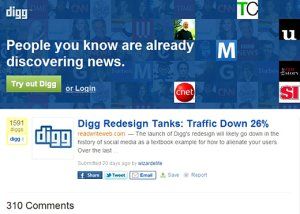
Four years ago Kevin Rose, the boyish, 20-something founder of Digg, was on the cover of BusinessWeek under a headline that screamed HOW THIS KID MADE $60 MILLION IN 18 MONTHS. Digg wasn't rocket science. It was just a Web site where people could vote for news stories they liked so that popular stories rose to the top. And Rose hadn't actually made $60 million. That was just what his shares in Digg would be worth based on pie-in-the-sky estimates of the company's value. "People in the know say Digg is easily worth $200 million," BusinessWeek wrote.
The problem with those "people in the know" is that Silicon Valley is filled with them, and most of them don't know all that much. Digg struggled for a few years, then swooned, and now finds itself in free fall. One year ago the site attracted 18 million unique visitors in the United States. By last month that number had plunged to 5.3 million, according to ComScore. (Digg says the figures are higher than what ComScore reports but concedes traffic has dropped.)
Rose never got his $60 million, and chances are he won't. Digg will generate about $15 million in revenue this year and still operates at a loss, estimates Michael Arrington, editor of TechCrunch, a blog that tracks Silicon Valley startups. Digg's backers would likely be willing to sell the company now for as little "as $20 million to $30 million," Arrington says. That's a bummer, since investors have pumped $40 million into this outfit since it was founded in 2004, and Rose and his backers are rumored to have had chances to sell the company for $130 million.
Digg's collapse has become a cautionary tale for so-called Web 2.0 companies in Silicon Valley, even the current crop of superstars, like Facebook and Twitter. The basic problem is that these new-media companies don't really have customers; they have audiences. Starting a company like Digg is less like building a traditional tech company (think Apple or HP) and more like launching a TV show. And perhaps, like TV shows, these companies are ephemeral in nature. People flock in for a while, then get bored and move on.
Maybe there's nothing wrong with that, especially since these companies aren't that expensive to launch, and some of them make a lot of money before they fizzle out. MySpace, the social-networking site, has seen its traffic decline 36 percent over the past three years but still generates close to $400 million a year in revenue, according to eMarketer, a Web researcher.
Digg's wounds are at least partially self-inflicted. In August, Digg introduced a new design that users hated. Reaction was so bad that for a time some of the most popular stories on Digg were about how awful Digg had become.
Rose and the company's new CEO, Matt Williams, who joined on Sept. 1, began scrambling to restore features that had been dropped, such as a "bury button" that lets users vote down stories they don't like. "We very much disappointed our user community, and we're deeply sorry," Williams says. "We have very passionate users, and I know we can return Digg to a place they love."
But Digg's traffic had begun to slide even before the bad redesign, due to a much larger problem: Twitter. That site started out as a way to let people blast out 140-character posts, but has evolved into a way for people to pass along links to news items they find interesting. Williams insists that Twitter and Digg perform completely different tasks.
That's true. They are different. But this is how disruption happens in tech. It's hardly ever about direct competition. Rather, something comes out of left field and provides a new way to do something. There have been plenty of Digg clones, but none of them ever hurt Digg very much. And nobody could have predicted that Twitter would take the place of Digg—not even the guys who created Twitter. And, if history is a guide, Twitter itself will be disrupted by something equally impossible to predict. This is why Facebook's Mark Zuckerberg said at a conference a few months ago that "the biggest competitor for us is someone we haven't heard of."
Can anyone create an enduring business on the Web, where it's easy to build new companies, and when survival depends on the whims of fickle users? The big lesson of Digg may be simply this: if someone offers you a ridiculous amount of money for a company that wasn't that hard to build, don't think twice. Take the money and run.
Uncommon Knowledge
Newsweek is committed to challenging conventional wisdom and finding connections in the search for common ground.
Newsweek is committed to challenging conventional wisdom and finding connections in the search for common ground.
About the writer
To read how Newsweek uses AI as a newsroom tool, Click here.





